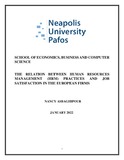| dc.description.abstract | The purpose of this study is to look at the link between human resource management practices (HRM) and job satisfaction in European firms. The study is carried out by hypothesizing the influence of human resource management techniques on work satisfaction; furthermore, this impact is thought to be mediated through job satisfaction and employee performance. Employee involvement is also included because of its possible moderating influence within the proposed model.
Because of the rising need for expertise and service orientation, the importance of unique personnel for the success of a European firm has grown dramatically, and job happiness has become more crucial in the struggle for the most appealing employees. Improving job satisfaction also has other benefits. it has been shown, for example, to have a direct influence on consumer satisfaction.
According to the findings of this study, there is a high degree of model fit between HRM practices, organizational commitment, and job satisfaction, and organizational commitment partially mediates the association between HRM practice and job satisfaction. This outcome led to the conclusion that human resource management methods, organizational commitment, and work satisfaction are critical factors in the success of public and private businesses. Various European firms can profit from the findings of this study by learning about the degree of satisfaction among their personnel.
This study employs a quantitative method, consisting of online surveys for workers that assess employee happiness and loyalty. For testing, the T-test association model is utilized. It is intended that this study may benefit academics and human resource managers in European companies as well as other organizations. | en_UK |


